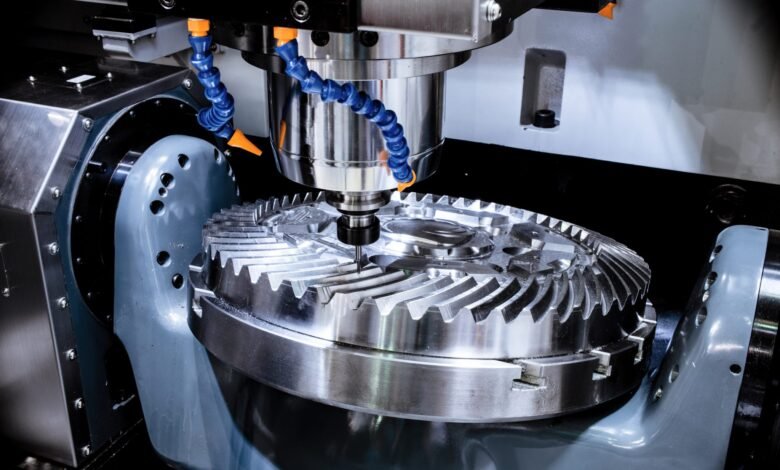
Introduction
In the world of modern manufacturing, precision and efficiency are paramount. As industries continue to evolve, the need for advanced manufacturing processes that can deliver high-quality products at scale has never been more pressing. One such process that has revolutionized production is CNC (Computer Numerical Control) machining. CNC machining combines computer-controlled technology with traditional manufacturing techniques to produce complex and high-precision parts. This article explores the role of CNC machining in modern manufacturing, highlighting its importance, benefits, and applications across various industries.
What is CNC Machining?
CNC machining is a manufacturing process that involves the use of computer-controlled machines to perform a wide range of operations, including drilling, milling, turning, and grinding, on various materials such as metals, plastics, and composites. The process uses a pre-programmed computer software to control the movement of machine tools and the material being processed. Unlike manual machining, where operators control the machine’s movements by hand, CNC machining automates the entire process, allowing for higher precision, repeatability, and speed.
The core of CNC machining is the software that converts a digital design into instructions that guide the machine’s actions. This software uses a 3D model of the part to create a set of commands, known as G-code, which directs the machine to cut or shape the material in precise ways. CNC machines are used in various industries, from aerospace to automotive, medical devices, and beyond, to create high-quality components with tight tolerances.
The Key Benefits of CNC Machining
CNC machining has revolutionized the manufacturing sector by offering several advantages over traditional methods. These benefits are driving its widespread adoption across industries, allowing manufacturers to improve quality, reduce lead times, and streamline production processes.
1. Precision and Accuracy
One of the most significant advantages of CNC machining is the high level of precision and accuracy it offers. CNC machines can produce parts with extremely tight tolerances, often within a fraction of a millimeter. This level of precision is essential in industries such as aerospace, automotive, and medical devices, where even the slightest deviation from specifications can lead to significant issues. The ability to consistently produce parts with such accuracy ensures that products meet the required quality standards and perform as intended.
2. Increased Efficiency and Productivity
CNC machining is known for its ability to operate at high speeds, which leads to increased efficiency and productivity. CNC machines can run 24/7 with minimal downtime, allowing manufacturers to produce large quantities of parts in a shorter amount of time. Additionally, CNC machines can perform multiple operations in a single setup, reducing the need for manual intervention and improving workflow efficiency.
The automation provided by CNC machining also reduces human error, which is often a concern in manual machining. This leads to fewer defects and less rework, ultimately improving production timelines and reducing costs.
3. Complex and Intricate Designs
CNC machining is particularly well-suited for creating complex and intricate designs that would be difficult or impossible to achieve with traditional manufacturing methods. The ability to program the machine with specific instructions allows for the production of highly detailed parts, including those with irregular shapes, fine details, and multiple features.
Whether it’s creating aerospace components with intricate geometries or medical implants with customized features, CNC machining enables designers and engineers to push the boundaries of what is possible in manufacturing. This capability opens up new possibilities in product design and development, enabling the creation of innovative and highly functional components.
4. Reduced Material Waste
CNC machining is a subtractive manufacturing process, meaning that material is removed from a workpiece to create the desired part. While this might seem to imply material waste, CNC machining is actually highly efficient in terms of material usage. The process ensures that only the required amount of material is removed, minimizing waste. This is especially beneficial when working with expensive materials, such as metals or composites, where reducing material waste can lead to significant cost savings.
Additionally, CNC machines can be programmed to optimize cutting paths, ensuring that material is used in the most efficient way possible. This not only reduces waste but also contributes to more sustainable manufacturing practices.
5. Flexibility and Versatility
CNC machining is highly flexible and versatile, making it suitable for a wide range of applications. CNC machines can be easily reprogrammed to accommodate different designs and materials, allowing manufacturers to quickly adapt to changes in product requirements. This flexibility is particularly beneficial in industries that require rapid prototyping or small batch production, as it enables quick turnaround times and reduced lead times.
Furthermore, CNC machines can perform a variety of operations, including turning, milling, drilling, and grinding, all within the same machine setup. This versatility makes CNC machining an ideal solution for producing a diverse range of parts, from simple components to highly complex assemblies.
Applications of CNC Machining Across Industries
CNC machining plays a crucial role in numerous industries, providing the precision and efficiency required for the production of high-quality components. Below are some of the key industries that benefit from CNC machining:
1. Aerospace
The aerospace industry is one of the primary sectors that rely heavily on CNC machining. Aerospace components must meet stringent quality and safety standards, and even the smallest deviations in dimensions can have catastrophic consequences. CNC machining provides the precision and repeatability required for the production of critical parts such as turbine blades, landing gear components, and structural elements.
In addition to high precision, the aerospace industry often requires parts with complex geometries and lightweight designs. CNC machining’s ability to produce intricate parts with fine details makes it ideal for creating aerospace components that are both functional and lightweight, which is essential for fuel efficiency and performance.
2. Automotive
The automotive industry also benefits greatly from CNC machining, as it allows manufacturers to produce high-quality, precise components for vehicles. From engine parts to transmission components, CNC machining is used to create a wide range of automotive parts that require high precision and durability.
Additionally, CNC machining plays a critical role in the production of custom and aftermarket parts. With the increasing demand for customized vehicles and parts, CNC machining enables manufacturers to produce low-volume runs of customized components with the same precision as mass-produced parts.
3. Medical Devices
The medical device industry demands precision, reliability, and consistency in its products. CNC machining is particularly important in the production of medical implants, surgical instruments, and other critical medical components. CNC machines can produce highly accurate parts with smooth finishes, which is essential for the performance and safety of medical devices.
In the field of personalized medicine, CNC machining enables the production of custom implants or prosthetics tailored to individual patients. This level of customization is essential for improving patient outcomes and ensuring the proper fit of medical devices.
4. Electronics
CNC machining is also widely used in the electronics industry to create components such as housings, heat sinks, connectors, and brackets. These components often require high precision and complex designs to fit into electronic devices like smartphones, computers, and other consumer electronics. CNC machining allows for the rapid production of these components with tight tolerances, ensuring that the final products function properly.
5. Tooling and Industrial Equipment
CNC machining plays a significant role in the production of tooling and industrial equipment. Manufacturers use CNC machines to create molds, dies, jigs, and fixtures used in the production of other parts. The ability to produce highly accurate and durable tooling is essential for ensuring the quality and efficiency of manufacturing processes.
For example, in injection molding, CNC-machined molds are used to produce parts with precise dimensions and smooth surfaces. Similarly, CNC-machined tooling is used in metalworking, such as for shaping and forming metal parts with high precision.
6. Defense and Military
In the defense and military sectors, CNC machining is critical for producing parts that meet stringent specifications for safety, performance, and durability. Components for military vehicles, aircraft, weapons systems, and defense equipment often require high precision and the ability to withstand extreme conditions. CNC machining ensures that these parts are manufactured to exact standards, providing the reliability and performance needed for defense applications.
The Future of CNC Machining
The role of CNC machining is likely to continue growing as technological advancements make machines faster, more accurate, and more versatile. Innovations in automation, artificial intelligence (AI), and machine learning are expected to further enhance CNC machining capabilities. These technologies could lead to smarter manufacturing processes that optimize design and production, reduce errors, and further minimize lead times.
Additionally, the integration of 3D printing with CNC machining could open up new possibilities for manufacturing, combining the strengths of both technologies to produce even more complex and efficient parts.
Conclusion
CNC machining plays a crucial role in modern manufacturing, offering precision, efficiency, and versatility that are essential for producing high-quality components across a wide range of industries. From aerospace to automotive, medical devices, and defense, CNC machining has become an integral part of the production process, enabling manufacturers to meet the increasing demands for quality, customization, and efficiency. As the technology continues to advance, the role of CNC machining in shaping the future of manufacturing will only continue to grow.



